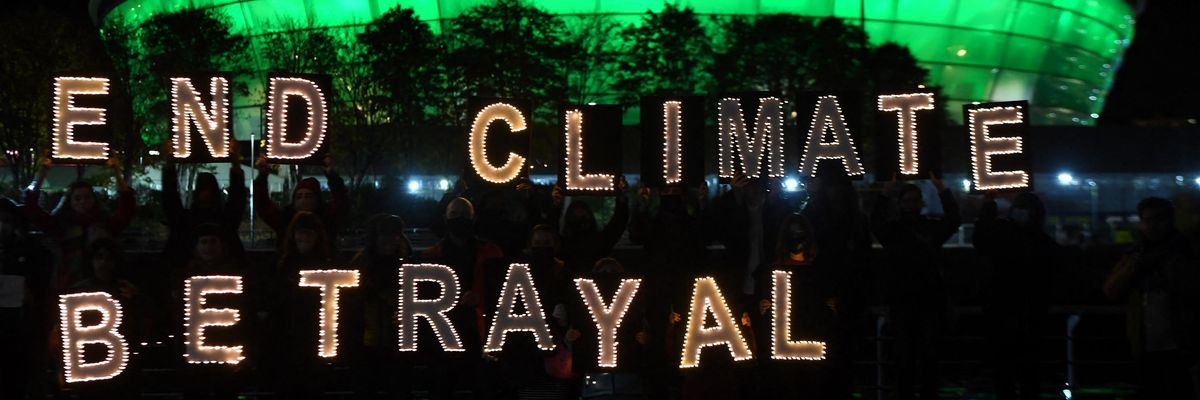"An equitable fossil fuel phaseout would place most of the burden squarely on the US and rich countries...This would be unacceptable to Biden administration negotiators.
"Instead, the COP26 existing language has heavy implications for developing countries like India, and tonnes of loopholes for the continuation of US fossil fuel activities," he tweeted.
Bitter
But it came as a bitter blow to many developing nations, many of whom had expressed deep disappointment with the text during the afternoon's plenary meeting, but had reluctantly accepted it in order to move forward.
Many--small island states in particular--had come to Glasgow hoping for agreement on the provision of finance for loss and damage.
This refers to the impacts of climate change that cannot be adapted to, such as sea level rise and rising temperatures, as well as extreme events such as floods, hurricanes and tropical cyclones.
But the US, Australia, Japan and the European Union blocked moves to create the fund. Instead, the pact sets up a process for discussion on arrangements for funding of activities to "avert, minimise and address loss and damage".
Shauna Aminath, minister of environment for the Maldives, said during the afternoon plenary:"For some loss and damage may be the beginning of dialogue.
"For us, this is a matter of survival... please do us the courtesy to acknowledge that it does not bring hope to our hearts, but serves as yet another conversation where we put our homes on the line, when those who have other options decide how quickly they want to act to save those who don't."
Scotland was praised for promising PS1 million for loss and damage, the first government to make any such commitment, later doubling it to PS2 million.
Adaptation
Developing countries did succeed in their plea for finance for adaptation to double. Up to now, projects to adapt infrastructure and livelihoods to climate change have only received 25 percent of global climate finance.
But this is still nowhere near enough, and will compound future needs for loss and damage funding, according to Simon Addison, team leader of public policy for climate resilient development at the International Institute for Environment and Development.
"Without adaptation finance coming soon and at scale vulnerable countries will not be able to overcome the climate risks they face, pushing them deeper into a cascade of loss and damage impacts from which they may not be able to recover," he tweeted.
Harjeet Singh, senior advisor of Climate Action Network and the Fossil Fuel Non-Proliferation Treaty Initiative, said: "While the outcome from the summit recognised the gap in dealing with losses and damages in developing countries, the step to provide finance and deliver justice to the climate victims has been delayed. We are walking in inches when we must move in miles."
Carbon market
More positively, COP26 saw agreement on the final elements of the so-called "Paris rulebook", meaning that these elements can now be implemented.
All countries will need to produce new emission reduction plans before the next UN climate talks in 2022, in recognition that current plans are not sufficient.
By 2024, all countries will have to report detailed data on emissions, which will form the baseline against which future reductions can be measured.
Rules governing a new carbon market, which will allow countries to trade credits from emissions reductions between each other were agreed.
Loopholes
These had seen major disagreement in previous COPs in Madrid and Katowice, in particular on whether loopholes that would have allowed for double counting of emissions reductions would be allowed.
James Roth, senior vice president of global policy and government affairs at nature charity Conservation International said that countries could now ensure carbon markets that were "high-quality, consistent and transparent".
"This level of certainty will drive new investments to scale the climate actions we desperately need across all sectors, including halting deforestation and promoting other natural climate solutions," he said.
However, some commentators believe the language was not clear enough to stop companies gaming the system.
"The rules agreed at COP26 are far from perfect with some major loopholes...especially for carbon markets. If exploited, they could seriously undermine efforts to reduce emissions," said Tom Evans, policy advisor at think tank E3G.

